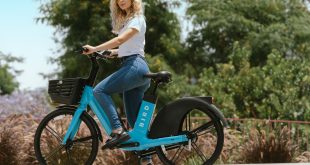Rebecca Morley looks at the impact of the French capital’s recent referendum result and what lessons can be learnt when it comes to safety
This piece first appeared in the June edition of BikeBiz magazine – get your free subscription here
Safety is one of the biggest talking points when it comes to the ongoing discussions around e-scooters, in the UK and around the world. But while these vehicles are becoming more and more common in many towns and cities, a landmark referendum in Paris earlier this year saw residents vote to ban rental e-scooters in the French capital, a result that many will see as a step backwards for micromobility.
The referendum was called partly in response to a rising number of people being injured and killed, as three people died and 459 were injured in e-scooter accidents in Paris last year. Almost 90% of votes cast on Sunday, April 2 favoured a ban of shared e-scooter schemes, albeit with a low turnout (around 8% of registered voters), and while the vote was non-binding, city authorities promised they would follow the will of its residents.
An evolving space
So what does this result mean for micromobility – is it a step backwards? Speaking to MMB, British e-scooter brand Pure Electric said it’s important to consider the broader context of the decision and its implications. “Rental or private, the use of e-scooters is still in its infancy and is a dynamic space from a regulatory perspective. This is a sign of the evolution of e-scooter use. A maturity if you like,” the company said.

“The Paris referendum was driven in-part by concerns over congestion on sidewalks and in city parks caused by rental e-scooters. Additionally, micromobility is a rapidly evolving space and this will lead to many more exciting opportunities for innovation, sustainability and progress in how we navigate the streets.”
Oscar Morgan, CEO of mobility startup Bo – winner of Newcomer of the Year at the BikeBiz Awards 2022 – said the result is not positive, but in some ways it is perhaps a ‘necessary wake up call for the sector’. “This can be seen as the outcome when you force your product upon people without full consideration for the side effects.”
Morgan continued: “As a result, the same people who raise no objection to their air, earth and water being relentlessly polluted by cars are sufficiently angry about how scooters are parked to go out and vote to ban it. We ignore that at our peril.
“Rather than arguing about how wrong people are to hate this efficient, safe, convenient mode of transport, better to deploy that energy innovating to improve the parking and management and find ways to make them love it instead.”
Improve or reduce
But what impact will the result have on e-scooter sales? Privately-owned e-scooters are legal in France and will still be allowed in the capital, with Paris mayor Anne Hidalgo previously describing them as “not a problem”.
“The decision is to not renew the operating licence in Paris after August 31 for the self-service e-scooter providers which will impact 27,000 daily rental users,” said Pure Electric. “Paris is a hugely important market for Pure Electric and looking at the numbers we expect that sales of our e-scooters to increase by 200%.”
Morgan said Bo has heard contradictory arguments that it will both improve scooter sales through rental users buying their own, and that it will reduce them – out of sight means out of mind, and people could be less inspired to make a purchase.

“Our analysis is that in the short term it may create a minor boost through the end of 2023 as people replace their rentals with a purchase, but in the long term it will reduce awareness and lead to a small increase in the cost of acquisition for companies selling e-scooters,” Morgan said.
Much attention will now also be on how other countries respond to the vote, and if rental scooters could be banned elsewhere. E-scooter trials have been live across the UK since launching in July 2020, and are set to run until May 2024. The vehicles can be used on the roads, except motorways, and in cycle lanes, but can not be ridden on the pavement. The maximum speed for a rented e-scooter is 15.5mph, and cycle helmets are recommended.
It is still however against the law to ride a privately-owned e-scooter, without a licence, tax and insurance, and many in the industry are eagerly anticipating a change in legislation for this, particularly after the Government last year announced its intention to create a low-speed zero-emission category that is independent from the cycle and motor vehicle categories. While the Government’s initial commitment was to introduce the legislation in the current parliamentary session, there is still no clear indication when private e-scooters will actually be legalised.
A lot to learn

On what we might see happen in other countries following the Paris vote, Morgan said: “The UK ought to legalise them before it starts banning them. Because the UK has been significantly stricter in the initial roll out, anecdotally people are far more positive than in countries where it started as a free-for-all ‘scootergeddon’.
“The scooters were introduced to most UK cities with specific parking locations, and after a few teething issues the systems now work well. As a result, there is little popular demand for a ban and extensive popular demand for legalisation and private ownership.
“Whether other EU cities will follow Paris’ lead, we suspect remains a question as to whether operators respond to this shock by improving and refining how the schemes are administered. The primary culprit is clear: people are not happy with how they are parked. A shift to on-street (off pavement) parking is the shortest step to improving that across the board.”
Read more: See.Sense partners with Newham borough to aid ‘15-minute neighbourhood’ project
Pure Electric said the UK has ‘a lot to learn’ from what we have seen in Paris. “Other cities will follow, and many cities are suspending their rental scooter trials. Ultimately, we see a hybrid structure shared between rental and private e-scooter use adopted across most cities. We have already seen this successfully implemented.
“The private ownership of e-scooters does aid in resolving many issues raised in Paris – there is a lot to learn. Yet we need greater clarity from governments about when legislation will be brought forward.
“We absolutely welcome more regulation to increase rider and pedestrian safety. Specifically in the UK, e-scooters are subject to the same vehicle regulations as cars. Changes made here that set clear rules will be a massive step forward in addressing safety and use-related concerns for e-scooters.”
 micromobilitybiz Delivering news updates to the micromobility industry, focusing on e-bikes, e-scooters and green transport
micromobilitybiz Delivering news updates to the micromobility industry, focusing on e-bikes, e-scooters and green transport




